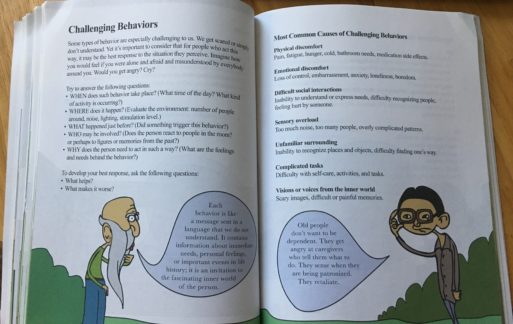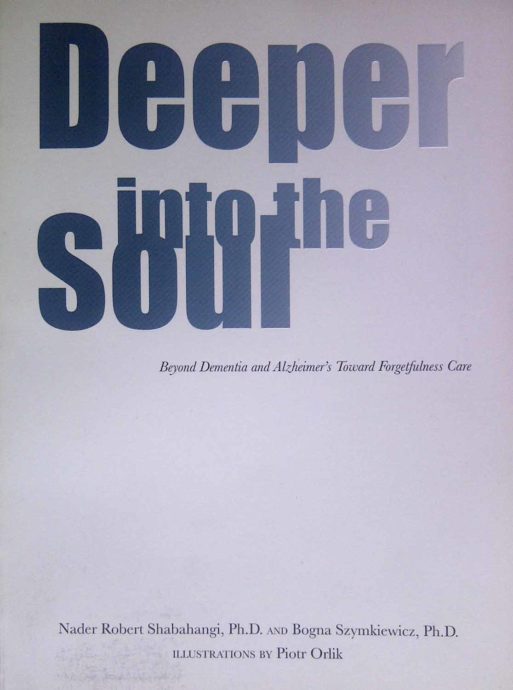“Deeper into the Soul: Beyond Dementia and Alzheimer’s Toward Forgetfulness Care,” is a guidebook for people and caregivers who live and work with loved ones or patients who have symptoms of dementia.
The authors implore us to re-brand dementia and Alzheimer’s as “forgetfulness.” Nader Shabahangi and Bogna Szymkiewicz purport that the term “dementia” stigmatizes people with symptoms of forgetting. Though certainly a medical diagnosis, people often think of dementia strictly as an illness. “Deeper into the Soul” challenges its readers to think of forgetfulness in a much more holistic way, encompassing a wide range of emotions and potentials.
Four Characters
“Deeper into the Soul” is written for adults, but the layout resembles a children’s book. It’s comprised of both text and illustrations, which helps to break up the content. It’s not an exhaustive guide to forgetfulness by any means, as it utilizes lists more than dense paragraphs.
The authors use four characters throughout the book to help us in our journey to re-thinking dementia as forgetfulness. Early on we are introduced to Master Susushi, a sage who often questions our initial ideas about forgetfulness; Ms. Jenny, a young trainee who has many questions about aging and the people she works with; Dr. David, a psychologist who uses practical knowledge to describe what’s occurring; and finally Dr. Karen, a medical doctor who brings the biological understanding of dementia into the conversations.
It’s important to note that these characters were created by the authors; they aren’t real people. However, they serve an important function by bringing four different perspectives into the discourse. Oftentimes, the characters are shown having conversations with each other. Other times they address the reader directly.
For instance, during a section of the book that describes the medical definitions of different kinds of dementia, we have Dr. Karen and Master Susushi. Dr. Karen tells us the word dementia comes from the Latin de: away from, and mens: mind. Literally, “away from the mind.” Master Susushi then retorts that, although it has been translated as having no-mind, “going away from mind” could also mean “going somewhere else.”

Example of illustration from “Deeper into the Soul”
It’s an interesting way to portray the different viewpoints we can use to re-think dementia and forgetfulness. The dialogues presented make the topics much more well-rounded, and combine to make “Deeper into the Soul” a very approachable book.
Four Parts
“Deeper into the Soul” is divided into four different sections: “Changing Attitudes,” “Understanding Forgetfulness,” “Learning Skills” and an Appendix.
“Changing Attitudes” deals mainly with the re-branding of dementia as forgetfulness and challenges us to “join people where they are.” One of the more intriguing lessons the book teaches us is to think about forgetfulness as an “enriching journey for both sides.”
Our society tends to think of forgetfulness as purely bad; mainly because losing one’s identity is a frightening notion. Indeed, people with forgetfulness don’t seem to be entirely in our everyday reality. But one method of re-thinking dementia introduced in “Deeper into the Soul” is to consider different realities: the consensus, Dreamland and Essence realities.

Credit: bluebirdcare.co.uk
This discussion gets metaphysical but is important when thinking about people dealing with forgetfulness. They go into their own inner worlds in much more profound ways than those who don’t have the condition. “Deeper into the Soul” begs us to think about forgetfulness as part of the overarching “life journey.”
“Understanding Forgetfulness” deals with the medical side of things — how dementia is understood in biological terms. Part three, “Learning Skills,” is meant primarily as a guide for caregivers to learn more positive ways to interact with people with forgetfulness. It’s given from the authors’ perspective of “forgetfulness care.” The Appendix then introduces different approaches, such as reminiscence therapy, habilitation therapy and validation therapy.
Learning to interact with and care for people who have dementia is a multi-faceted, often difficult process. It can be very overwhelming for newcomers, as dementia is a very disorienting, frightening and confusing condition. “Deeper into the Soul” is a good introductory guide for both caregivers and people who want a better understanding of dementia and its intricacies.

 “Deeper into the Soul,” by Nader Shabahangi, Ph.D. and Bogna Szymkiewicz, Ph.D.
“Deeper into the Soul,” by Nader Shabahangi, Ph.D. and Bogna Szymkiewicz, Ph.D.



 John Mulaney’s “Funeral Planning” on Netflix: No Real Plan
John Mulaney’s “Funeral Planning” on Netflix: No Real Plan

 Composting Bodies Is Now Legal in a Dozen States
Composting Bodies Is Now Legal in a Dozen States














